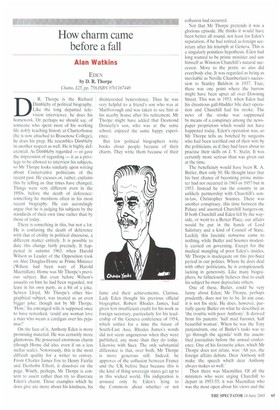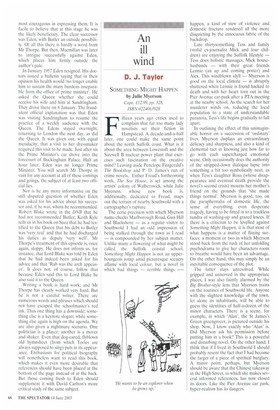How charm came before a fall
Alan Watkins
EDEN
by D. R. Thorpe
Chatto, £25, pp. 758,ISBN 0701167440
D. R. Thorpe is the Richard Dimbleby of political biography. Like the long departed television interviewer, he does his homework. Or perhaps we should say, of someone who spent most of his working life nobly teaching history at Charterhouse (he is now attached to Brasenose College), he does his prep. He resembles Dimbleby in another respect as well. He is highly deferential. As Dimbleby regarded — or gave the impression of regarding — it as a privilege to be allowed to interview his subjects, so Mr Thorpe looks similarly upon writing about Conservative politicians of the recent past. He excuses or, rather, explains this by telling us that times have changed. Things were very different even in the 1950s. before the death of deference: something he mentions often in his most recent biography. He can accordingly argue that he is judging his subjects by the standards of their own time rather than by those of today.
There is something in this, but not a lot. He is confusing the death of deference with that of civility in political discourse, a different matter entirely. It is possible to date this change fairly precisely. It happened in autumn 1963, when Harold Wilson as Leader of the Opposition took on Alec Douglas-Home as Prime Minister (Wilson had been wary of Harold Macmillan). Home was Mr Thorpe's previous subject. But even before Wilson's assaults on him he had been regarded, not least in his own party, as a bit of a joke. Selwyn Lloyd, Mr Thorpe's other biographical subject, was treated as an even bigger joke, though not by Mr Thorpe. 'How,' his estranged wife is supposed once to have remarked, 'could any woman love a man who wears a cardigan over his pyjamas?'
On the face of it, Anthony Eden is more promising material. He was certainly more glamorous. He possessed enormous charm (though Home did also, even if on a less stellar scale). Notoriously, this is the most difficult quality for a writer to convey. From Charles James Fox to Henry Fairlie and Denholm Elliott, it dissolves on the page. Wisely, perhaps, Mr Thorpe is content to assert rather than try to illustrate Eden's charm. Those examples which he does give are more about his kindness, his disinterested benevolence. Thus he was very helpful to a friend's son who was at Marlborough and was taken to see him at his nearby house after his retirement. Mr Thorpe might have added that Desmond Donnelly's son, who was at the same school, enjoyed the same happy experience.
But few political biographers write books about people because of their charm. They write them because of their fame and their achievements, Clarissa, Lady Eden thought his previous official biographer, Robert Rhodes James, had given him insufficient credit for his work as foreign secretary, particularly for his leadership of the Geneva conference of 1954, which settled for a time the future of South-Fast Asia. Rhodes James's words did not seem ungenerous when they were published, any more than they do today. Likewise with Suez. The only substantial difference is that, over both, Mr Thorpe is more generous still. Indeed, he approves of the collusion between France and the UK before Suez because this is the kind of thing sovereign states get up to in this wicked world. His indignation is aroused only by Eden's lying to the Commons about whether or not collusion had occurred.
Not that Mr Thorpe pretends it was a glorious episode. He thinks it would have been better all round, not least for Eden's reputation, if he had retired as foreign secretary after his triumph at Geneva. This is a singularly pointless hypothesis. Eden had long wanted to be prime minister and saw himself as Winston Churchill's natural successor. More to the point, so also did everybody else. It was regarded as being as inevitable as Neville Chamberlain's succession to Stanley Baldwin in 1937. True, there was one point where the barrow might have been upset all over Downing Street, This was in 1953, when Eden had his disastrous gall-bladder bile duct operation and Churchill had his stroke. The news of the stroke was suppressed by means of a conspiracy among the newspaper proprietors which would not have happened today. Eden's operation was, so Mr Thorpe tells us, botched by surgeons who had been terrified out of their wits by the politicians, as if they had been about to practise their skills on J. V. Stalin. It was certainly more serious than was given out at the time.
The beneficiary would have been R. A. Butler, then only 50. He thought later that his best chance of becoming prime minister had not occurred in 1963 or 1957 but in 1953. Instead he ran the country in an unlikely partnership with Churchill's sonin-law, Christopher Soames. There was another conspiracy, this time between the Palace and assorted Churchill hangers-on. If both Churchill and Eden fell by the wayside, or went to a Better Place, our affairs would he put in the hands of Lord Salisbury and a kind of Council of State. Luckily this fascistic nonsense came to nothing, while Butler and Soames modestly carried on governing. Except for the medical mangling of poor Eden's insides, Mr Thorpe is inadequate on this pre-Suez period in our politics. Where he does deal with other politicians, he is conspicuously lacking in generosity. Like many biographers, he fallaciously believes that to exalt his subject he must depreciate others.
One of these, Butler, could he very funny about Eden; Mr Thorpe, perhaps prudently, does not try to be. In any case, it is not his style, He does, however, partially quote Butler on what he described as 'the trouble with poor Anthony'. It derived from his parents: 'half mad baronet, half beautiful woman'. When he was the Tory panjandrum, one of Butler's tasks was to `go through the agenda' with the assembled journalists before the annual conference. One of his favourite jokes, which Mr Thorpe does not relate, was: 'Ah yes, the foreign affairs debate, Dear Anthony will make the speech which dear Anthony always makes so well.'
Then there was Macmillan. Of all the ministers who were urging Churchill to depart in 1953-55, it was Macmillan who was the most open about his views and the most courageous in expressing them. It is facile to believe that at this stage he was the likely beneficiary. The clear successor was Eden, with Butler an outside possibility. Of all this there is hardly a word from Mr Thorpe. But then, Macmillan was later to intrigue successfully against Eden, which places him firmly outside the author's pale.
In January 1957 Eden resigned. His doctors issued a bulletin saying that in their opinion his health would 'no longer enable him to sustain the many burdens inseparable from the office of prime minister'. He asked the Queen whether she could receive his wife and him at Sandringham. They drove there on 8 January. The fraudulent official explanation was that Eden was visiting Sandringham to resume the practice of a weekly audience with the Queen. The Edens stayed overnight, returning to London the next day, as did the Queen. It was given out, with equal mendacity, that a visit to her dressmaker required this visit to be made. Just after six the Prime Minister's car drove into the forecourt of Buckingham Palace. Half an hour later, Eden was no longer Prime Minister. You will search Mr Thorpe in vain for any account at all of these comings and goings, the subject of at least two official lies.
Nor is he any more informative on the still disputed question of whether Eden was asked for his advice about his successor and, if he was, whom he recommended. Robert Blake wrote in the DNB that he had not recommended Butler; Keith Kyle tells us in his book on Suez that he had testified to the Queen that his debt to Butler was 'very real' and that he had discharged his duties as deputy 'very well'. Mr Thorpe's treatment of this episode is, once again, sloppy. He does not inform us, for instance, that Lord Blake was told by Eden that he had indeed been asked for his advice and that 'Rab was the arch appeaser'. It does not, of course, follow that because Eden said this to Lord Blake he also said it to the Queen.
Writing a book is hard work; and Mr Thorpe has clearly worked very hard. But he is not a careful writer. There are numerous words and phrases which should not have escaped the schoolmaster's red ink. Thus one thing has a downside; something else is a keynote slogan; while something else again is high on the agenda. We are also given a nightmare scenario. One politician is a player; another is a mover and shaker. Even that dog-eared, flyblown old hymnsheet (from which Tories are always supposed to sing) puts in its appearance. Enthusiasts for political biography will nonetheless want to read this book, which makes it even more desirable that references should have been placed at the bottom of the page instead of at the back. But those coming fresh to Eden should supplement it with David Carlton's more critical study of the same subject.



































































































 Previous page
Previous page